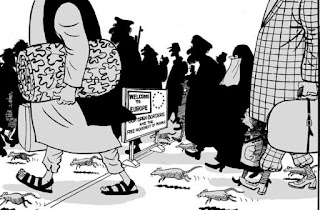When Kate Forbes, candidate for leader of the Scottish Nationalist Party (SNP), in the wake of the resignation of Nicola Sturgeon, said recently that she would not have voted for gay marriage had she been an MSP, there was considerable criticism made from all quarters. The critics came from both the wider LGBT community, but also from some leading SNP figures. Ms Forbes did not help herself by saying that she believed it was "wrong" to have a child outside marriage. Nor was she helped by inadvertently drawing support from conservative quarters such as The Spectator. Stephen Daisley wrote in Boris Johnson's old paper:
"There is an uncommon graciousness and generosity of spirit at work in this woman. She is a nationalist ideologue, utterly committed to breaking up the UK, but she’s so achingly, infuriatingly reasonable about it."
In spite of this unwanted approbation, Ms Forbes responded with dignity to the attacks made upon her, issuing a statement on Facebook and Twitter:
"I will defend to the hilt the right of everybody in Scotland, particularly minorities, to live and to live without fear or harassment in a pluralistic and tolerant society.
I will uphold the laws that have been won, as a servant of democracy, and seek to enhance the rights of everybody to live in a way which enables them to flourish.
I firmly believe in the inherent dignity of each human being - that underpins all ethical and political decisions I make."
Now, my initial reaction was to condemn Ms Forbes outright - without giving her a fair hearing and without examining the context. After some reflection, however, I came to believe that this was part of a larger issue of politics and religious belief and decided to investigate further. What I found was, to me, surprising.
So, I thought, how unique is Kate Forbes? Is she the only practising Christian, nay, the only religious believer in our political setup? The answer is: far from it. The first political religious group I located online was Christians in Parliament, which, as it says, is:
"...an All-Party Parliamentary Group, which exists to support all Members and staff in their work in the Houses of Parliament",
Members include Tim Farron, MP, and Lord David Alton (LibDems), Stephen Timms, MP, Marsha de Cordova, MP, (Labour), Desmond Swayne, MP, Gary Streeter, MP, (Conservative) and Sir Jeffery Donaldson of the DUP. There is a YouTube video, featured on their website and hosted by the one-time Tory MP, Nicky Morgan, called "Why should Christians get involved in politics?". All of which suggests to me that perhaps Kate Forbes is not alone in being a practising Christian and a politician.
Of course, political party divisions can sometimes override religious solidarity. This is proven by the article in Premier Christian News, which recorded Keir Starmer's supplanting of Jeremy Corbyn by saying:
"Labour’s new top team consists of 14 MPs who ascribe to the Christian faith.A week after being elected as Jeremy Corbyn’s replacement, Keir Starmer has chosen his shadow cabinet – the MPs who will speak and work on specific topics.In a team of 98 there are fourteen politicians who are members of Christians on the Left, which is affiliated with the Labour party."
This 2020 article informed me that....
"On the front bench is Jonathan Reynolds, chair of Christians on the Left and the new shadow work and pensions secretary. A broad church of people join him, including David Lammy and Marsha De Cordova. Bridget Phillipson, a Roman Catholic, and Cat Smith, a Methodist who says her faith led to her involvement in politics, are the shadow chief secretary to the treasury and minister for young people respectively.
So, then, Christians of all denominations are already active in politics, some of whom must share Kate Forbes' views on gay marriages and births out of wedlock. Kate Forbes, then, is hardly an exception.
But what about other faiths? Well, I was interested to learn that 18 Muslim MPs were elected to Parliament in 2019. As The Muslim News says:
"Muslim candidates won a record of 18 Parliamentary seats at this month’s General Election, three more than in 2017 but slightly less than expected as Boris Johnson’s Conservative Party scored a resounding 80 seat majority.The number of successful Muslim candidates are spread over London, the South-East, the Midlands, North-West and North East, though none are in Scotland, Wales or Northern Ireland. No less than 10 are Muslim women, including Apsana Begum, 29, in the safe Labour seat of Poplar and Limehouse, who is the first hijab-wearing MP".-David Miliband, current Labour Secretary of State for Foreign and Commonwealth Affairs
-Malcolm Rifkind, Foreign Secretary from 1995-97
-Sydney Silverman, Labour MP responsible for the abolition of capital punishment in 1965
-Leo Abse, a Labour MP for nearly 30 years who pushed through reforms on homosexual relations in 1966
-Leslie Hore-Belisha (British Liberal, then Conservative), who Introduced the driving test and in 1934 the Belisha beacon
-LibDem peer Lord Lester, whose two Private Members’ Bills became the models for the Human Rights Act 1998
-Lord Lawson, Chancellor from 1983-89
-Edwina Currie, Junior Health Minister from 1986-88
-Leon Brittain, Home Secretary from 1983-85
-Lord Emmanuel (Manny) Shinwell, a minister in the two pre-war Labour governments. In 1938 he slapped a Conservative MP who had shouted: “Go back to Poland, you Polish Jew”














